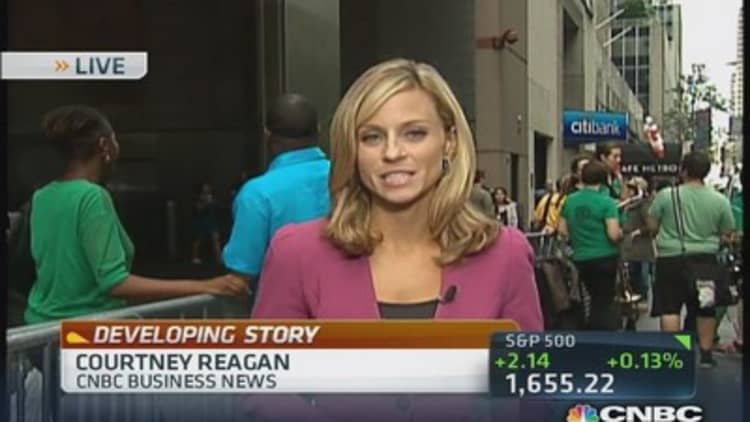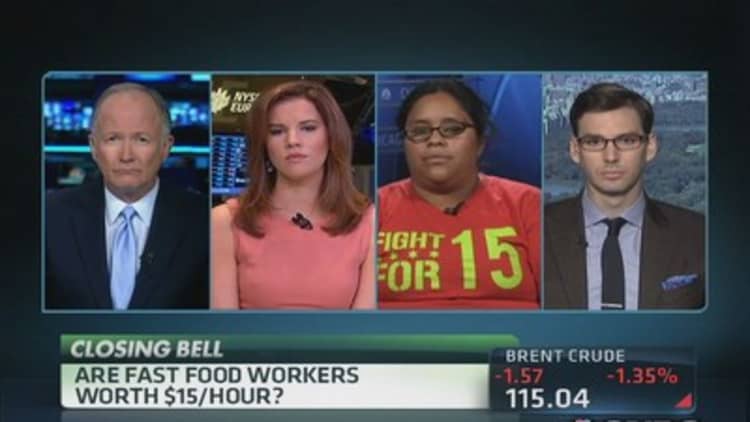In many stores around the country, the workers stocking the shelves and ringing up the gifts are at the very heart of this season's retail lament — many Americans are so financially strapped that projections for holiday sales have grown bleaker by the week.
And more so than in years past, the focus is on retail workers as more stores open on Thanksgiving Day, requiring many more to work on the holiday. Even if they have the option of staying home, those still stuck at the bottom economic rung long after the recession's end have little choice but to take on extra shifts.
Food stamps have been cut for some, and many were stung by the payroll tax increase. Even their own companies have set up food drives to aid low-paid employees at individual stores or created help lines advising them how to stretch their food dollars and apply for public assistance.
(Read more: Take cover! Bond market 'hell' could be on the way)
Chardé Nabors, a mother of two who works as a $9-an-hour cashier at Sears in the Chicago Loop, feels left behind by the holiday festivities, partly because she was scheduled to work from 7:30 p.m. Thanksgiving to 6 a.m. Friday. "I'm here watching shoppers buy all these items, and I'm working to help these people, and I can't even buy my children the same products," said Ms. Nabors, whose 3-year-old son wants a Spider-Man doll she cannot afford.

For retail workers nationwide, who earn a median pay of about $9.60 an hour, or less than $20,000 a year, holiday shopping sprees are most often enjoyed by customers on the opposite side of the counter.
On Black Friday, workers at Walmart and their union allies plan to stage protests at some 1,500 Walmart stores to demand higher pay. Moreover, many lawmakers, seeing the squeeze on incomes nationwide, are pushing an idea that they say could give a much-needed boost to retailers' languishing sales: increasing the minimum wage.
The idea has been picking up momentum, with several new developments in the last month.
More from The New York Times:
Retailers' Sly Message: Get Yourself a Gift, Too
MortgagesWithout Risk, at Least for the Banks
Lighting Up the Lawn With 16 Million Colors
The Massachusetts State Senate approved a measure last week that would increase that state's minimum wage to $11 an hour, far more than the $7.25-an-hour federal minimum. Hoping to reduce low-wage workers' dependence on government aid, a conservative billionaire in California, Ronald Unz, is backing a referendum to raise his state's minimum wage to $12 — even more than the $10 minimum that Gov. Jerry Brown signed into law in September. And on Tuesday, officials in Washington State announced that voters in SeaTac, a Seattle suburb, had approved a referendum to establish a $15-an-hour minimum wage for the 6,500 workers at the international airport there. Also this week in Maryland, the Montgomery and Prince George's county councils voted to raise the minimum to $11.50 an hour by 2017.
Earlier this month, White House officials said they would back a bill in Congress that calls for raising the federal minimum to $10.10 an hour over two years, although opposition within the Republican-controlled House makes passage unlikely anytime soon. Major retailers and fast-food companies have opposed an increase, saying it would force them to raise prices and reduce worker numbers.
Median pay for the nation's 3.4 million fast-food workers stands at $8.80 an hour. For Tenesha Hueston, a shift manager at a Burger King in Durham, N.C., a $10.10 minimum wage would be a godsend for her Christmas shopping. She says her pay — $7.75 an hour —is too meager for her to buy the gifts her children are hankering for: a bicycle for her 5-year-old son and a Leapfrog Tablet learning toy for her 4-year-old daughter. Ms. Hueston, 36 and recently divorced, does housecleaning on the side, and moved back into her father's house with her children last spring when Burger King reduced her weekly hours.
(Read more: Many holiday shoppers buy first, and eat later)
With a higher wage, Ms. Hueston said, "I'd be able to buy things. Maybe I'd be able to move out of my father's house. Maybe I could get off food stamps. Maybe I could start giving back to the economy."
By a large majority, Americans support raising the minimum wage, according to a CBS News Poll done from Nov. 15 through 18. The poll, which surveyed 1,010 Americans, found that 69 percent of respondents approved of raising the minimum wage, while 25 percent opposed the idea.
Thirty-three percent said they backed raising the wage to $9 an hour, while 36 percent supported an increase to $10.10 an hour, the amount that Congressional Democrats are pushing.
Republicans support an increase by 57 percent to 38 percent, Democrats by 84 percent to 11 percent and independents by 64 percent to 29 percent.
Carla Bean, a 69-year-old Republican who lives in Oklahoma City, said she strongly backed raising the minimum wage to $10.10 an hour.
"They seem to be increasing all the food and utilities and clothing and everything, and I think people should have the salary to keep up with that," said Ms. Bean, retired from her job as a cashier in the cafeteria of a shuttered General Motors plant. "The current minimum wage is not enough for people to pay for their medications and feed their children and themselves — even if they're living alone."
Craig McGirr, a management consultant who lives in Bridgman, Mich., said he opposed raising the federal minimum wage, saying that there are some very low-cost areas to live in where an increase would not be warranted.

Mr. McGirr, an independent, said the best way for workers to increase their wages was by getting more education.
But some studies and experts suggest that big-box retailers like Walmart and Kmart, whose customer base includes many low-income households, would reap higher revenue from an increase in the minimum wage.
A study by BigInsights Monthly Consumer Survey found that about one-fourth of Walmart's customers come from households earning less than $25,000 a year and nearly two-fifths from households earning less than $35,000. At Kmart, about a third of its customers have household incomes of less than $25,000, and nearly half receive less than $35,000. As for Target, a little more than a quarter of its shoppers have household incomes below $35,000.
Gregg W. Steinhafel, Target's chief executive, acknowledged recently that "lower- and middle-income households are shopping cautiously" because of "very tight household budgets." And Bill Simon, the head of Walmart's United States operations, noted that shoppers' "income is going down while food costs are not." Walmart's same-store sales in the United States slid three quarters in a row.
Burt P. Flickinger III, managing director of the Strategic Resource Group, a retail consulting firm, said numerous factors were affecting retail sales, especially among discount stores. He said several chains had cut employees' hours so much that shelves were often poorly stocked, upsetting shoppers and pushing them to online shopping.
(Read more: Three things investors need to watch in December)
"Employees," he added, "can often be an important shopping group for a store, especially during the holiday season. A lot of them are hurting financially, and that can hurt a store's sales."
Retailers and fast-food restaurants are facing a growing wave of protests as employees assert that wages of $7.50, $8 or $8.50 an hour are far too low to support themselves, much less a family. Fast-food workers held one-day strikes in more than 60 cities in August demanding raises to $15 an hour, and organizers hope to have walkouts in even more cities on Dec. 5.
Walmart and McDonald's have faced some embarrassing episodes over the issue of low pay.
News that a Walmart store in Canton, Ohio, was doing a food drive to ensure that its employees had enough for Thanksgiving went viral on the Internet. Walmart officials said the food drive was a laudable effort in which the company and its employees were banding together to help co-workers in need because of sudden hardship, like a divorce.
And last July, a McDonald's company website advising workers on how to budget, developed with the credit card giant Visa, was widely ridiculed on television and social media. It suggested that workers hold two jobs, did not include expenses for heating or child care, and anticipated payments of $20 a month for health insurance.
Last week, social media mocked another McDonald's internal website, which advised employees on how to live healthier and reduce stress. One suggestion was to sing to oneself, another was to break food into pieces, to feel fuller and perhaps stretch one's budget.
Alan B. Krueger, a Princeton economics professor who stepped down in August as chairman of the President's Council of Economic Advisers, said an increase in the minimum wage would help ease weakness in consumer demand, a problem for the American economy since the recession hit in late 2007.
He pointed to a study by economists at the Federal Reserve in Chicago, which found that a dollar-an-hour increase would translate into a $700 increase in spending per quarter the year after enactment for each household with a minimum-wage earner. Nearly four million workers earn the minimum wage, but the Economic Policy Institute, a liberal think tank, estimates that wages for 30 million workers would be lifted if Congress approved an increase to $10.10 an hour. Mr. Krueger was co-author of a landmark study that found that a modest increase in the minimum wage did not result in hiring cutbacks.
"The U.S.," Professor Krueger said, "clearly faces the problem of weak aggregate demand, and this weakness has been aggravated by stagnant real wage growth of low-income families."
House Republicans have indicated they will block any increase in the minimum wage, arguing that it would cause businesses to cut back hiring and hurt companies' bottom lines.
Tyler Cowen, an economics professor at George Mason University, questioned whether raising the minimum wage would increase consumer demand.
"You'd have to consider how many people would be laid off as a result," he said. "I don't see the evidence that it would work out so well."
Professor Cowen said that increasing the earned-income tax credit would lift incomes and consumer demand, without resulting in less hiring.
—By Steven Greenhouse of The New York Times


